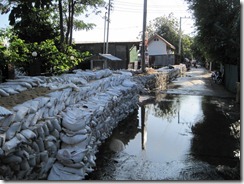Today’s headlines are filled with surprising news. Perhaps most shocking is the untimely death of long-time ABC Nightly News Anchor Peter Jennings, who succumbed to lung cancer at age 67. Jennings, along with fellow news anchors Dan Rather and Tom Brokaw, was a giant in television news. He was one of the few remaining news celebrities from a bygone era. Like many Americans, for years I frequently watched Jennings’ news broadcasts. Of the three anchors, I personally enjoyed Jenning’s broadcasts and commentaries more than those of Brokaw and Rather. Although Brokaw’s prime-time news ratings were usually higher than those of Jennings, I never got used to Brokaw’s nasally accent. I never really enjoyed the somber, sometimes cavalier style of Rather. Jennings, to me, was the only who was easy on the eyes and ears, even if he was not always objective in his reporting. (I also thought it curious that Jennings, a Canadian who became an American citizen in 2003, became one of America’s most beloved newscasters.) I enjoyed Peter Jenning’s "World News Tonight" in my earlier years, and although I’ve long since abandoned the 5 o’clock news as my main news source, I still enjoyed seeing Jennings from time to time. One wonders who will replace him as ABC’s news anchor. Tom Brokaw and Dan Rather retired and ceded their chairs to new anchors, but Jennings did not leave behind an heir apparent. Charles Gibson, co-host of "Good Morning America," and Elizabeth Vargas have both filled in for Jennings, but it’s not clear whether either will take over the helm of "World News Tonight." Gibson would be the most obvious choice, but that would leave behind a critical vacancy at "Good Morning America." Naming Vargas news anchor would be a gutsy move on ABC’s part. I hope they do. National news anchor is one of the few "glass ceilings" women have not shattered. Connie Chung briefly co-hosted the news with Dan Rather, but her stint was short-lived. Elizabeth Vargas would provide ABC with a much-needed edge when it comes to news. ABC has long been an also-ran to NBC and cable television when it comes to broadcasting "cookie cutter" news. For me personally, losing someone like Peter Jennings is a sad event, and it makes me fondly remember simple times when watching television meant ABC, CBS, NBC, and PBS. I felt the same way when Johnny Carson and John Ritter, passed away. Peter, you will be missed. My condolences to the loved ones you left behind.
Rumors also abound that Cisco Systems, the networking equipment giant, will buy out Nokia, the king of cell phones. That would be a gigantic acquisition in the world of technology. Apparently Cisco Chief Executive John Chambers is eyeing Nokia for its wireless potential. I hate to rush to judgment, but it really sounds like a disaster waiting to happen. Cisco has mastered the art of acquiring and integrating smaller companies that complement its networking businesses, but acquiring Nokia? Although the Finnish company is still the world’s largest cell phone company, it is losing ground to smaller, nimbler rivals, particularly Asian companies such as Samsung and LG. Even Motorola has gained ground against Nokia in recent years. A few years ago, Nokia would have been untouchable, but now it is vulnerable. Cisco is fundamentally a networking company whose expertise is in routers and back-end technology. Acquiring a giant, mobile handset company does little to enhance Cisco’s existing businesses. I may be wrong, but this merger makes as much sense to me as did Adobe/Macromedia, Hewlett-Packard/Compaq and AOL/Time Warner. Perhaps the two can create vital synergies, and perhaps Chambers is a cutting-edge visionary who sees greater potential in combining networking and mobile solutions. I would rather be skeptical.
Also today, the Upper House of the Japanese Diet voted 125-108 to reject Prime Minister Koizumi’s plan to privatize the Japanese Postal Savings System. As a result, Koizumi promptly dissolved the Lower House and called for elections on September 11. The privatization plan would have dissolved the Japanese Postal System and separated mail delivery, post offices, savings and insurance into four separate entities. The latter two would have been privatized. The savings entity, which holds about 34% of all Japanese savings deposits, would have become the world’s largest private savings bank. However, Japanese lawmakers voted the proposal down, citing postal layoffs and decreased service. While the defeat was not surprising, it highlights the slow pace of financial reform in Japan. Prime Minister Koizumi will force the issue by calling elections next month that will essentially be a referendum on dissolving the system. The Japanese Postal Savings System is gargantuan. Its sheer size encourages Japanese households to place their savings in a system that offers negligible returns (1%-2% annually). Over 80% of the Postal Savings System’s portfolio is invested in low-yield bonds, especially government bonds, leaving Japanese households with little to show for their diligent savings. Breaking up the system and privatizing Japanese savings would increase the likelihood that Japanese savers will earn a better return for their money. Americans may have a low-to-negative savings rate, but fortunately, many recognize the value of smart investing and compensate by investing in higher-risk, higher-return investments.
Finally, I put together a list of stocks I’ve highlighted on my blog and my own recommendations. As my recommendations change, I’ll revise them. I’ll add and drop some depending on how closely I follow them. Remember that I am not a professional money manager, and you have to make your own investment choices. Some equities such as DreamWorks Animation (DWA) have few analyst ratings, so I hope my recommendations will fill in the gaps.



